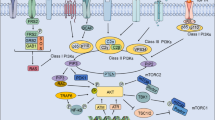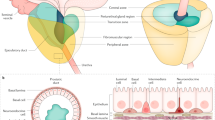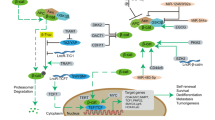Abstract
Neuroendocrine prostate cancer (NEPC) has increasingly become a clinical challenge. The mechanisms by which neuroendocrine (NE) cells arises from prostate adenocarcinoma cells are poorly understood. FOXA1 is a transcription factor of the forkhead family that is required for prostate epithelial differentiation. In this study, we demonstrated that FOXA1 loss drives NE differentiation, demarcated by phenotypical changes and NEPC marker expressions. Mechanistically, this is mediated by FOXA1 binding to the promoter of interleukin 8 (IL-8), a chemokine previously shown elevated in NEPC, to directly inhibit its expression. Further, IL-8 upregulation activates the MAPK/ERK pathway, leading to ERK phosphorylation and enolase 2 (ENO2) expression. IL-8 knockdown or ERK inhibition, on the other hand, abolished FOXA1 loss-induced NE differentiation. Analysis of xenograft mouse models confirmed FOXA1 loss in NEPC tumors relative to its adenocarcinoma counterparts. Importantly, FOXA1 is downregulated in human NEPC tumors compared to primary and castration-resistant prostate cancers, and its expression is negatively correlated with that of ENO2. These findings indicate that FOXA1 transcriptionally suppresses IL-8, the expression of which would otherwise stimulate the MAPK/ERK pathway to promote NE differentiation of prostate cancer cells. Our data strongly suggest that FOXA1 loss may play a significant role in enabling prostate cancer progression to NEPC, whereas IL-8 and MAPK/ERK pathways may be promising targets for therapeutic intervention.
This is a preview of subscription content, access via your institution
Access options
Subscribe to this journal
Receive 50 print issues and online access
$259.00 per year
only $5.18 per issue
Buy this article
- Purchase on Springer Link
- Instant access to full article PDF
Prices may be subject to local taxes which are calculated during checkout






Similar content being viewed by others
References
Siegel RL, Miller KD, Jemal A . Cancer statistics, 2016. CA Cancer J Clin 2016; 66: 7–30.
Hirano D, Okada Y, Minei S, Takimoto Y, Nemoto N . Neuroendocrine differentiation in hormone refractory prostate cancer following androgen deprivation therapy. Eur Urol 2004; 45: 586–592; discussion 592.
Beltran H, Tagawa ST, Park K, MacDonald T, Milowsky MI, Mosquera JM et al. Challenges in recognizing treatment-related neuroendocrine prostate cancer. J Clin Oncol 2012; 30: e386–e389.
Yuan TC, Veeramani S, Lin FF, Kondrikou D, Zelivianski S, Igawa T et al. Androgen deprivation induces human prostate epithelial neuroendocrine differentiation of androgen-sensitive LNCaP cells. Endocr Relat Cancer 2006; 13: 151–167.
Santoni M, Conti A, Burattini L, Berardi R, Scarpelli M, Cheng L et al. Neuroendocrine differentiation in prostate cancer: novel morphological insights and future therapeutic perspectives. Biochim Biophys Acta 2014; 1846: 630–637.
Sagnak L, Topaloglu H, Ozok U, Ersoy H . Prognostic significance of neuroendocrine differentiation in prostate adenocarcinoma. Clin Genitourin Cancer 2011; 9: 73–80.
Culine S, El Demery M, Lamy PJ, Iborra F, Avances C, Pinguet F . Docetaxel and cisplatin in patients with metastatic androgen independent prostate cancer and circulating neuroendocrine markers. J Urol 2007; 178: 844–848; discussion 848.
Aparicio AM, Harzstark AL, Corn PG, Wen S, Araujo JC, Tu SM et al. Platinum-based chemotherapy for variant castrate-resistant prostate cancer. Clin Cancer Res 2013; 19: 3621–3630.
Parimi V, Goyal R, Poropatich K, Yang XJ . Neuroendocrine differentiation of prostate cancer: a review. Am J Clin Exp Urol 2014; 2: 273–285.
Chen H, Sun Y, Wu C, Magyar CE, Li X, Cheng L et al. Pathogenesis of prostatic small cell carcinoma involves the inactivation of the P53 pathway. Endocr Relat Cancer 2012; 19: 321–331.
Murphy C, McGurk M, Pettigrew J, Santinelli A, Mazzucchelli R, Johnston PG et al. Nonapical and cytoplasmic expression of interleukin-8, CXCR1, and CXCR2 correlates with cell proliferation and microvessel density in prostate cancer. Clin Cancer Res 2005; 11: 4117–4127.
Li Z, Chen CJ, Wang JK, Hsia E, Li W, Squires J et al. Neuroendocrine differentiation of prostate cancer. Asian J Androl 2013; 15: 328–332.
Huang J, Yao JL, Zhang L, Bourne PA, Quinn AM, di Sant'Agnese PA et al. Differential expression of interleukin-8 and its receptors in the neuroendocrine and non-neuroendocrine compartments of prostate cancer. Am J Pathol 2005; 166: 1807–1815.
Wilson C, Purcell C, Seaton A, Oladipo O, Maxwell PJ, O'Sullivan JM et al. Chemotherapy-induced CXC-chemokine/CXC-chemokine receptor signaling in metastatic prostate cancer cells confers resistance to oxaliplatin through potentiation of nuclear factor-kappaB transcription and evasion of apoptosis. J Pharmacol Exp Ther 2008; 327: 746–759.
Mori S, Murakami-Mori K, Bonavida B . Interleukin-6 induces G1 arrest through induction of p27(Kip1), a cyclin-dependent kinase inhibitor, and neuron-like morphology in LNCaP prostate tumor cells. Biochem Biophys Res Commun 1999; 257: 609–614.
Bang YJ, Pirnia F, Fang WG, Kang WK, Sartor O, Whitesell L et al. Terminal neuroendocrine differentiation of human prostate carcinoma cells in response to increased intracellular cyclic AMP. Proc Natl Acad Sci USA 1994; 91: 5330–5334.
Cox ME, Deeble PD, Bissonette EA, Parsons SJ . Activated 3',5'-cyclic AMP-dependent protein kinase is sufficient to induce neuroendocrine-like differentiation of the LNCaP prostate tumor cell line. J Biol Chem 2000; 275: 13812–13818.
Kim J, Adam RM, Freeman MR . Activation of the Erk mitogen-activated protein kinase pathway stimulates neuroendocrine differentiation in LNCaP cells independently of cell cycle withdrawal and STAT3 phosphorylation. Cancer Res 2002; 62: 1549–1554.
Spiotto MT, Chung TD . STAT3 mediates IL-6-induced neuroendocrine differentiation in prostate cancer cells. Prostate 2000; 42: 186–195.
Zhang XQ, Kondrikov D, Yuan TC, Lin FF, Hansen J, Lin MF . Receptor protein tyrosine phosphatase alpha signaling is involved in androgen depletion-induced neuroendocrine differentiation of androgen-sensitive LNCaP human prostate cancer cells. Oncogene 2003; 22: 6704–6716.
Song Y, Washington MK, Crawford HC . Loss of FOXA1/2 is essential for the epithelial-to-mesenchymal transition in pancreatic cancer. Cancer Res 2010; 70: 2115–2125.
Besnard V, Wert SE, Kaestner KH, Whitsett JA . Stage-specific regulation of respiratory epithelial cell differentiation by Foxa1. Am J Physiol Lung Cell Mol Physiol 2005; 289: L750–L759.
Bernardo GM, Lozada KL, Miedler JD, Harburg G, Hewitt SC, Mosley JD et al. FOXA1 is an essential determinant of ERalpha expression and mammary ductal morphogenesis. Development 2010; 137: 2045–2054.
Gao N, LeLay J, Vatamaniuk MZ, Rieck S, Friedman JR, Kaestner KH . Dynamic regulation of Pdx1 enhancers by Foxa1 and Foxa2 is essential for pancreas development. Genes Dev 2008; 22: 3435–3448.
Mirosevich J, Gao N, Matusik RJ . Expression of Foxa transcription factors in the developing and adult murine prostate. Prostate 2005; 62: 339–352.
Wan H, Dingle S, Xu Y, Besnard V, Kaestner KH, Ang SL et al. Compensatory roles of Foxa1 and Foxa2 during lung morphogenesis. J Biol Chem 2005; 280: 13809–13816.
DeGraff DJ, Grabowska MM, Case TC, Yu X, Herrick MK, Hayward WJ et al. FOXA1 deletion in luminal epithelium causes prostatic hyperplasia and alteration of differentiated phenotype. Lab Invest 2014; 94: 726–739.
Jin HJ, Zhao JC, Wu L, Kim J, Yu J . Cooperativity and equilibrium with FOXA1 define the androgen receptor transcriptional program. Nat Commun 2014; 5: 3972.
Jin HJ, Zhao JC, Ogden I, Bergan RC, Yu J . Androgen receptor-independent function of FoxA1 in prostate cancer metastasis. Cancer Res 2013; 73: 3725–3736.
Lin D, Dong X, Wang K, Wyatt AW, Crea F, Xue H et al. Identification of DEK as a potential therapeutic target for neuroendocrine prostate cancer. Oncotarget 2015; 6: 1806–1820.
Zhang X, Coleman IM, Brown LG, True LD, Kollath L, Lucas JM et al. SRRM4 Expression and the Loss of REST Activity May Promote the Emergence of the Neuroendocrine Phenotype in Castration-Resistant Prostate Cancer. Clin Cancer Res 2015; 21: 4698–4708.
Beltran H, Rickman DS, Park K, Chae SS, Sboner A, MacDonald TY et al. Molecular characterization of neuroendocrine prostate cancer and identification of new drug targets. Cancer Discov 2011; 1: 487–495.
Beltran H, Prandi D, Mosquera JM, Benelli M, Puca L, Cyrta J et al. Divergent clonal evolution of castration-resistant neuroendocrine prostate cancer. Nat Med 2016; 22: 298–305.
Akamatsu S, Wyatt AW, Lin D, Lysakowski S, Zhang F, Kim S et al. The placental gene PEG10 promotes progression of neuroendocrine prostate cancer. Cell reports 2015; 12: 922–936.
Martin-Orozco RM, Almaraz-Pro C, Rodriguez-Ubreva FJ, Cortes MA, Ropero S, Colomer R et al. EGF prevents the neuroendocrine differentiation of LNCaP cells induced by serum deprivation: the modulator role of PI3K/Akt. Neoplasia 2007; 9: 614–624.
Wightman SC, Uppal A, Pitroda SP, Ganai S, Burnette B, Stack M et al. Oncogenic CXCL10 signalling drives metastasis development and poor clinical outcome. Br J Cancer 2015; 113: 327–335.
Heidemann J, Ogawa H, Dwinell MB, Rafiee P, Maaser C, Gockel HR et al. Angiogenic effects of interleukin 8 (CXCL8) in human intestinal microvascular endothelial cells are mediated by CXCR2. J Biol Chem 2003; 278: 8508–8515.
Venkatakrishnan G, Salgia R, Groopman JE . Chemokine receptors CXCR-1/2 activate mitogen-activated protein kinase via the epidermal growth factor receptor in ovarian cancer cells. J Biol Chem 2000; 275: 6868–6875.
Morris EJ, Jha S, Restaino CR, Dayananth P, Zhu H, Cooper A et al. Discovery of a novel ERK inhibitor with activity in models of acquired resistance to BRAF and MEK inhibitors. Cancer Discov 2013; 3: 742–750.
Li Y, Donmez N, Sahinalp C, Xie N, Wang Y, Xue H et al. SRRM4 drives neuroendocrine transdifferentiation of prostate adenocarcinoma under androgen receptor pathway inhibition. Eur Urol 2016; 71: 68–78.
Grasso CS, Wu YM, Robinson DR, Cao X, Dhanasekaran SM, Khan AP et al. The mutational landscape of lethal castration-resistant prostate cancer. Nature 2012; 487: 239–243.
Wallace TA, Prueitt RL, Yi M, Howe TM, Gillespie JW, Yfantis HG et al. Tumor immunobiological differences in prostate cancer between African-American and European-American men. Cancer Res 2008; 68: 927–936.
Taylor BS, Schultz N, Hieronymus H, Gopalan A, Xiao Y, Carver BS et al. Integrative genomic profiling of human prostate cancer. Cancer Cell 2010; 18: 11–22.
Sun Y, Goodison S . Optimizing molecular signatures for predicting prostate cancer recurrence. Prostate 2009; 69: 1119–1127.
Cai C, Wang H, He HH, Chen S, He L, Ma F et al. ERG induces androgen receptor-mediated regulation of SOX9 in prostate cancer. J Clin Invest 2013; 123: 1109–1122.
Gao N, Zhang J, Rao MA, Case TC, Mirosevich J, Wang Y et al. The role of hepatocyte nuclear factor-3 alpha (Forkhead Box A1) and androgen receptor in transcriptional regulation of prostatic genes. Mol Endocrinol 2003; 17: 1484–1507.
Lupien M, Eeckhoute J, Meyer CA, Wang Q, Zhang Y, Li W et al. FoxA1 translates epigenetic signatures into enhancer-driven lineage-specific transcription. Cell 2008; 132: 958–970.
Wang D, Garcia-Bassets I, Benner C, Li W, Su X, Zhou Y et al. Reprogramming transcription by distinct classes of enhancers functionally defined by eRNA. Nature 2011; 474: 390–394.
Sahu B, Laakso M, Ovaska K, Mirtti T, Lundin J, Rannikko A et al. Dual role of FoxA1 in androgen receptor binding to chromatin, androgen signalling and prostate cancer. EMBO J 2011; 30: 3962–3976.
Chaffer CL, Brennan JP, Slavin JL, Blick T, Thompson EW, Williams ED . Mesenchymal-to-epithelial transition facilitates bladder cancer metastasis: role of fibroblast growth factor receptor-2. Cancer Res 2006; 66: 11271–11278.
Korpal M, Ell BJ, Buffa FM, Ibrahim T, Blanco MA, Celia-Terrassa T et al. Direct targeting of Sec23a by miR-200s influences cancer cell secretome and promotes metastatic colonization. Nat Med 2011; 17: 1101–1108.
Terry S, Beltran H . The many faces of neuroendocrine differentiation in prostate cancer progression. Front Oncol 2014; 4: 60.
Mosquera JM, Beltran H, Park K, MacDonald TY, Robinson BD, Tagawa ST et al. Concurrent AURKA and MYCN gene amplifications are harbingers of lethal treatment-related neuroendocrine prostate cancer. Neoplasia 2013; 15: 1–10.
Yu J, Cao Q, Mehra R, Laxman B, Yu J, Tomlins SA et al. Integrative genomics analysis reveals silencing of beta-adrenergic signaling by polycomb in prostate cancer. Cancer Cell 2007; 12: 419–431.
Yu J, Yu J, Mani RS, Cao Q, Brenner CJ, Cao X et al. An integrated network of androgen receptor, polycomb, and TMPRSS2-ERG gene fusions in prostate cancer progression. Cancer Cell 2010; 17: 443–454.
Yu Y, Liu L, Xie N, Xue H, Fazli L, Buttyan R et al. Expression and function of the progesterone receptor in human prostate stroma provide novel insights to cell proliferation control. J Clin Endocrinol Metab 2013; 98: 2887–2896.
Gao J, Aksoy BA, Dogrusoz U, Dresdner G, Gross B, Sumer SO et al. Integrative analysis of complex cancer genomics and clinical profiles using the cBioPortal. Sci Signal 2013; 6: pl1.
Cerami E, Gao J, Dogrusoz U, Gross BE, Sumer SO, Aksoy BA et al. The cBio cancer genomics portal: an open platform for exploring multidimensional cancer genomics data. Cancer Discov 2012; 2: 401–404.
Acknowledgements
This work was supported in part by the NIH R01CA172384 (to JY), prostate cancer SPORE P50CA180995 (to JY), the Institutional Ruth L. Kirschstein National Research Service Award from the National Institute of Diabetes and Digestive and Kidney Diseases T32 DK007169 (to JK).
Author information
Authors and Affiliations
Corresponding author
Ethics declarations
Competing interests
The authors declare no conflict of interest.
Additional information
Supplementary Information accompanies this paper on the Oncogene website
Supplementary information
Rights and permissions
About this article
Cite this article
Kim, J., Jin, H., Zhao, J. et al. FOXA1 inhibits prostate cancer neuroendocrine differentiation. Oncogene 36, 4072–4080 (2017). https://doi.org/10.1038/onc.2017.50
Received:
Revised:
Accepted:
Published:
Issue Date:
DOI: https://doi.org/10.1038/onc.2017.50
This article is cited by
-
Decoding the basis of histological variation in human cancer
Nature Reviews Cancer (2024)
-
FOXA1 and FOXA2: the regulatory mechanisms and therapeutic implications in cancer
Cell Death Discovery (2024)
-
ENO2-derived phosphoenolpyruvate functions as an endogenous inhibitor of HDAC1 and confers resistance to antiangiogenic therapy
Nature Metabolism (2023)
-
Aggressive variants of prostate cancer: underlying mechanisms of neuroendocrine transdifferentiation
Journal of Experimental & Clinical Cancer Research (2022)
-
FOXA1 inhibits hypoxia programs through transcriptional repression of HIF1A
Oncogene (2022)



